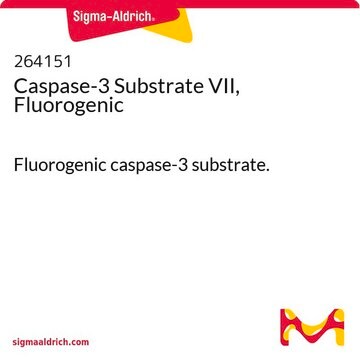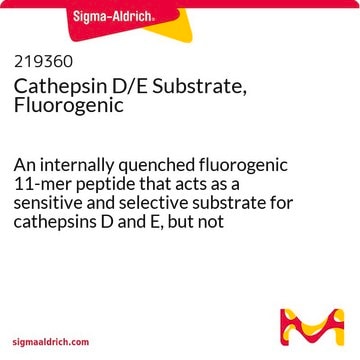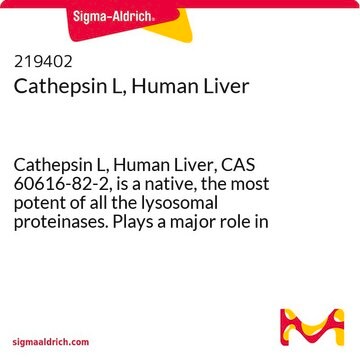342001
Procathepsin K, Human, Recombinant, E. coli
Recombinant, human procathepsin K expressed in E. coli with a methionine residue inserted at amino acid 18 to create a new N-terminal initiation site.
Anmeldenzur Ansicht organisationsspezifischer und vertraglich vereinbarter Preise
Alle Fotos(1)
About This Item
Empfohlene Produkte
Rekombinant
expressed in E. coli
Qualitätsniveau
Assay
≥95% (SDS-PAGE)
Form
liquid
Spezifische Aktivität
≥1000 mU/mg protein
Hersteller/Markenname
Calbiochem®
Lagerbedingungen
OK to freeze
avoid repeated freeze/thaw cycles
Versandbedingung
wet ice
Lagertemp.
−70°C
Allgemeine Beschreibung
If the activated enzyme is not used immediately, it is recommended to add methyl methanthiosulfonate (1 mM final concentration MMTS).
Note: 1 mU = 1 milliunit.
Recombinant, human procathepsin K (amino acids 19-329) (GenBank target symbol = S79895, ACC No. P43235) expressed in E. coli with a methionine residue inserted at amino acid 18 to create a new N-terminal initiation site. Cathepsin K, a member of the papain superfamiliy of cysteine proteinases, plays an important role in osteoclast-mediated bone resorption and collagen degradation. Cathepsin K is synthesized as an inactive proenzyme that is converted to its mature, active form by proteolytic cleavage of the 99 amino acid propeptide domain. Inhibitors of cathepsin K include leupeptin (Cat. No. 108975) (IC50 = 70 nM), E-64 (Cat. No. 324890) (IC50 = 5 nM), and cystatin (Cat. No. 324891 or 324896). Requires activation prior to use.
Recombinant, human procathepsin K (amino acids 19-329) (GenBank target symbol = S79895, ACC No. P43235) expressed in E. coli with a methionine residue inserted at amino acid 18 to create a new N-terminal initiation site. Cathepsin K, a member of the papain superfamily of cysteine proteinases, plays an important role in osteoclast-mediated bone resorption and collagen degradation. Cathepsin K is synthesized as an inactive proenzyme that is converted to its mature, active form by proteolytic cleavage of the 99 amino acid propeptide domain. Inhibitors of cathepsin K include leupeptin (Cat. No. 108975) (IC50 = 70 nM), E-64 (Cat. No. 324890) (IC50 = 5 nM), and cystatin (Cat. No. 324891 or 324896). Requires activation prior to use.
Verpackung
Please refer to vial label for lot-specific concentration.
Warnhinweis
Toxicity: Standard Handling (A)
Einheitendefinition
One unit is defined as the amount of enzyme that will hydrolyze 1 µmole benzyloxycarbonyl-phenylalanine-arginine-7-amido-4-methylcoumarin per min at 37°C, pH 5.5.
Physikalische Form
In 500 mM NaCl, 25 mM Tris, pH 8.0.
Rekonstituierung
Following initial thaw, aliquot and freeze (-70°C). Following activation the enzyme is unstable and should include MMTS for storage (see recommended reaction conditions for activation).
Sonstige Hinweise
McQueney, M., et al. 1997. J. Bio. Chem.272, 13955.
Bossard, M., et al. 1996. J. Biol. Chem.271, 12517.
Drake, F., et al. 1996. J. Biol. Chem.271, 12511.
Bromme, D. and Okamoto, K. 1995. Biol. Chem. Hoppe-Seyler376, 379.
Baron, R. 1989 Anat. Rec.224, 317.
Littlewood-Evans, A.J., et al. 1975. Cancer Res.57, 5386.
Nishimura, J.S. et al. 1975. Arch. Biochem. Biophys.170, 461.
Bossard, M., et al. 1996. J. Biol. Chem.271, 12517.
Drake, F., et al. 1996. J. Biol. Chem.271, 12511.
Bromme, D. and Okamoto, K. 1995. Biol. Chem. Hoppe-Seyler376, 379.
Baron, R. 1989 Anat. Rec.224, 317.
Littlewood-Evans, A.J., et al. 1975. Cancer Res.57, 5386.
Nishimura, J.S. et al. 1975. Arch. Biochem. Biophys.170, 461.
Rechtliche Hinweise
CALBIOCHEM is a registered trademark of Merck KGaA, Darmstadt, Germany
Lagerklassenschlüssel
12 - Non Combustible Liquids
WGK
WGK 2
Flammpunkt (°F)
Not applicable
Flammpunkt (°C)
Not applicable
Analysenzertifikate (COA)
Suchen Sie nach Analysenzertifikate (COA), indem Sie die Lot-/Chargennummer des Produkts eingeben. Lot- und Chargennummern sind auf dem Produktetikett hinter den Wörtern ‘Lot’ oder ‘Batch’ (Lot oder Charge) zu finden.
Besitzen Sie dieses Produkt bereits?
In der Dokumentenbibliothek finden Sie die Dokumentation zu den Produkten, die Sie kürzlich erworben haben.
Unser Team von Wissenschaftlern verfügt über Erfahrung in allen Forschungsbereichen einschließlich Life Science, Materialwissenschaften, chemischer Synthese, Chromatographie, Analytik und vielen mehr..
Setzen Sie sich mit dem technischen Dienst in Verbindung.







